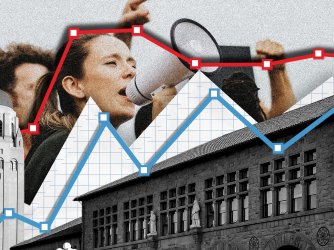Table of Contents
INVESTIGATION: Portland’s Lewis & Clark College mandates racial segregation in orientation programming

PORTLAND, Ore., Oct. 27, 2020 — Last week, two U.S. senators called on the Department of Justice to investigate alleged racial segregation in American schools. Today, an investigation by the Foundation for Individual Rights in Education reveals that Portland’s Lewis & Clark College also engaged in mandatory racial segregation in its first-year orientation program this fall. Furthermore, college leadership failed to take this problem seriously even after FIRE and one of the college’s own professors brought the unlawful program to their attention.
Lewis & Clark enlisted a Portland-based “social justice activism” group to run a mandatory orientation workshop Aug. 29 where, in the name of providing “safe spaces” for discussion, students were required to choose whether they most identified as one of three options: “Black,” “Indigenous, Person of Color,” or “White.” Students were then divided by race into different virtual Zoom breakout rooms for separate educational experiences, unlawfully limiting their ability within the program to engage with students of different races.
“Racial segregation is not only morally wrong, it’s illegal on our nation’s college campuses,” said FIRE Executive Director Robert Shibley. “Lewis & Clark must end this practice immediately and publicly commit to never again returning to that dark chapter of our nation’s history.”
TAKE ACTION: TELL LEWIS & CLARK COLLEGE TO END RACIAL SEGREGATION ON CAMPUS
If Supreme Court cases and federal laws prohibiting discrimination weren’t enough, Lewis & Clark’s own policies also prohibit such conduct, expressly stating that treating students differently on account of race is a clear violation.
Lewis & Clark Associate Professor of English Lyell Asher first raised concerns about the segregated event on a faculty email listserv Aug. 27, two days before it took place. He also forwarded the message to President Wim Wiewel and General Counsel David Reese, requesting that they look into it and suggesting that the segregated event should not be mandatory. Asher reports that he received no response, and he eventually contacted FIRE with his concerns.
After investigating, FIRE wrote to Lewis & Clark on Oct. 6, demanding that the private liberal arts college stop “reducing students to the sum of their blood and ancestry” by mandating racial segregation at any college event.
Reese responded Oct. 14, attempting to minimize both the event and its unlawful nature. He stated that while the event was labeled mandatory, attendance was not taken, students would not have been punished for skipping it, and it was only a single event. He further argued that this episode of segregation was not “invidious” and that “[s]tudents were not provided a different educational experience or outcome based on race, they simply had different individual conversations before coming back together as a larger group.” Noting that the session was “objectionable to at least one of our faculty members,” though, he stated in his conclusion that Lewis & Clark would in the future be “clearer that it is optional,” and that it was “uncertain” that they would have similar sessions in future years.
But that’s an unacceptable response — legally and morally.
“Mandatory racial segregation isn’t wrong because FIRE or a professor finds it objectionable — it’s wrong because it means that your ethnicity alone determines the education you receive,” Shibley said. “That it was just a little segregation, that ‘mandatory’ actually means ‘optional,’ or that the college meant well is no defense.”
TAKE ACTION: TELL LEWIS & CLARK COLLEGE TO END RACIAL SEGREGATION ON CAMPUS
“I find it hard to believe that Lewis & Clark’s top leadership didn’t know that segregation was wrong, and harder still to understand why they went right on subjecting students to this unlawful practice after Professor Asher flagged the issue,” Shibley said. “You have to wonder what else might be going on at Lewis & Clark.”
The Foundation for Individual Rights in Education (FIRE) is a nonpartisan, nonprofit organization dedicated to defending and sustaining the individual rights of students and faculty members at America’s colleges and universities. These rights include freedom of speech, freedom of association, due process, legal equality, religious liberty, and sanctity of conscience — the essential qualities of liberty.
CONTACT:
Daniel Burnett, Director of Communications, FIRE: 215-717-3473; media@thefire.org
Wim Wiewel, President, Lewis & Clark College: 503-768-7680; president@lclark.edu
Tell Lewis & Clark to end its practice of racial segregation
Recent Articles
FIRE’s award-winning Newsdesk covers the free speech news you need to stay informed.

A third of Stanford students say using violence to silence speech can be acceptable

Stanford president and provost cheer free expression in open letter to incoming class

FIRE survey shows Judge Duncan shoutdown had ‘chilling effect’ on Stanford students
